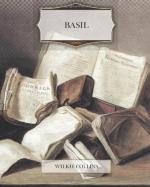“I thought,” resumed Clara, in rather lower tones than before, “that I would just look into your room before I went to the ball, and see that everything was properly arranged for you, in case you had any idea of writing tonight; I had just time to do this while my aunt, who is going with me, was upstairs altering her toilette. But perhaps you don’t feel inclined to write?”
“I will try at least.”
“Can I do anything more? Would you like my nosegay left in the room?—the flowers smell so fresh! I can easily get another. Look at the roses, my favourite white roses, that always remind me of my own garden at the dear old Park!”
“Thank you, Clara; but I think the nosegay is fitter for your hand than my table.”
“Good night, Basil.”
“Good night.”
She walked to the door, then turned round, and smiled as if she were about to speak again; but checked herself, and merely looked at me for an instant. In that instant, however, the smile left her face, and the grave, anxious expression came again. She went out softly. A few minutes afterwards the roll of the carriage which took her and her companion to the ball, died away heavily on my ear. I was left alone in the house—alone for the night.
VIII.
My manuscript lay before me, set in order by Clara’s careful hand. I slowly turned over the leaves one by one; but my eye only fell mechanically on the writing. Yet one day since, and how much ambition, how much hope, how many of my heart’s dearest sensations and my mind’s highest thoughts dwelt in those poor paper leaves, in those little crabbed marks of pen and ink! Now I could look on them indifferently—almost as a stranger would have looked. The days of calm study, of steady toil of thought, seemed departed for ever. Stirring ideas; store of knowledge patiently heaped up; visions of better sights than this world can show, falling freshly and sunnily over the pages of my first book; all these were past and gone—withered up by the hot breath of the senses—doomed by a paltry fate, whose germ was the accident of an idle day!
I hastily put the manuscript aside. My unexpected interview with Clara had calmed the turbulent sensations of the evening: but the fatal influence of the dark beauty remained with me still. How could I write?
I sat down at the open window. It was at the back of the house, and looked out on a strip of garden—London garden—a close-shut dungeon for nature, where stunted trees and drooping flowers seemed visibly pining for the free air and sunlight of the country, in their sooty atmosphere, amid their prison of high brick walls. But the place gave room for the air to blow in it, and distanced the tumult of the busy streets. The moon was up, shined round tenderly by a little border-work of pale yellow light. Elsewhere, the awful void of night was starless; the dark lustre of space shone without a cloud.




